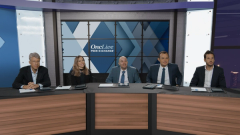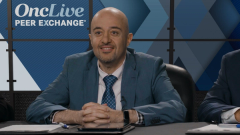
Second-Line Treatment Options for Lower-Risk MDS
Dr Platzbecker outlines available second-line therapies for symptomatic anemia in patients with lower-risk MDS, highlighting differences in availability between the United States and Europe.
Episodes in this series

Transcript:
Uwe Platzbecker, MD: The second-line options for del(5q) patients are limited. There are no approved options apart from maybe 1 very rare coincidence. This is the RS/SFD1 phenotype-genotype in 10% of del(5q) patients that can also be observed. Although those patients weren’t part of the phase 3 MEDALIST trial, we had some of those patients in the phase 2 program, and there were also some responses. There were only 2 or 3 patients in the program. But to make a long story short, anecdotal reports and personal communication suggests that luspatercept may also work in del(5q) RS/SFD1 cases. This could be an option. This is a case in which the TP53 mutation has not been systematically studied, but I would offer these patients luspatercept.
In the European Union, HMAs [Heads of Medicines Agencies] aren’t licensed for lower-risk patients with MDS [myelodysplastic syndrome]. In the given case, my second-line treatment would be allogeneic stem cell transplantation, at least at the time of early disease evolution. Monitoring is very important. If this isn’t an option or the patient is 75 years old, I’d look for a clinical trial at my center.
Rami Komrokji, MD: We see a difference in the pattern of practice between Europe, Canada, and the United States. In the United States, we have lenalidomide for non–del(5q). Hypomethylating agents are used extensively, probably more than what we’d like to see in the lower-risk patients with MDS. We have those options. The question is how to select the patients, how to think of the best sequence of those therapies.
Transcript edited for clarity.








































